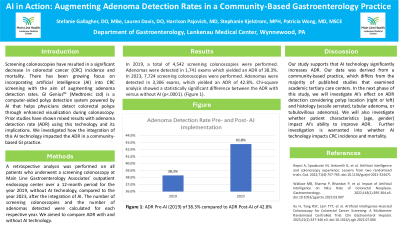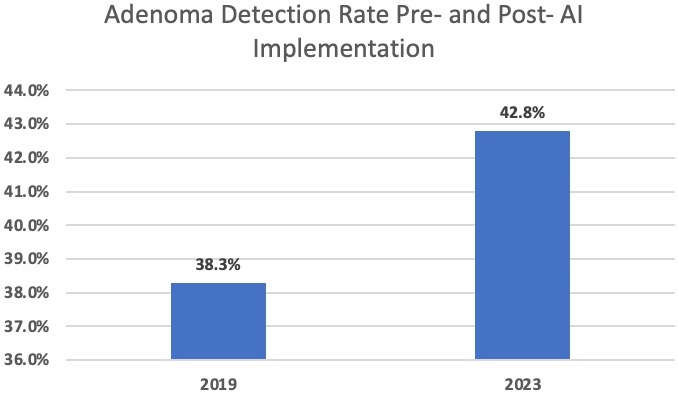Sunday Poster Session
Category: Colorectal Cancer Prevention
P0432 - AI in Action: Augmenting Adenoma Detection Rates in a Community-Based Gastroenterology Practice
Sunday, October 27, 2024
3:30 PM - 7:00 PM ET
Location: Exhibit Hall E

Has Audio
- SG
Stefanie Gallagher, DO
Lankenau Medical Center
Wynnewood, PA
Presenting Author(s)
Stefanie Gallagher, DO, Lauren Davis, DO, Harrison Pajovich, MD, Stephanie Kjelstrom, MPH, Patricia Wong, MD, MSCE
Lankenau Medical Center, Wynnewood, PA
Introduction: Screening colonoscopies have resulted in a significant decrease in colorectal cancer (CRC) incidence and mortality. There has been growing focus on incorporating artificial intelligence (AI) into CRC screening with the aim of augmenting adenoma detection rates. GI Genius™ (Medtronic Ltd) is a computer-aided polyp detection system powered by AI that helps physicians detect colorectal polyps through enhanced visualization during colonoscopy. Prior studies have shown mixed results with adenoma detection rate (ADR) using this technology and its implications. We investigated how the integration of this AI technology impacted the ADR in a community-based GI practice.
Methods: A retrospective analysis was performed on all patients who underwent a screening colonoscopy at Main Line Gastroenterology Associates’ outpatient endoscopy center over a 12-month period for the year 2019, without AI technology, compared to the year 2023, after the integration of AI. The number of screening colonoscopies and the number of adenomas detected were calculated for each respective year. We aimed to compare ADR with and without AI technology.
Results: In 2019, a total of 4,542 screening colonoscopies were performed. Adenomas were detected in 1,741 exams which yielded an ADR of 38.3%. In 2023, 7,724 screening colonoscopies were performed. Adenomas were detected in 3,306 exams, which yielded an ADR of 42.8%. Chi-square analysis showed a statistically significant difference between the ADR with versus without AI (p< .0001). (Figure 1).
Discussion: Our study supports that AI technology significantly increases ADR. Our data was derived from a community-based practice, which differs from the majority of published studies that examined academic tertiary care centers. In the next phase of this study, we will investigate AI’s effect on ADR detection considering polyp location (right or left) and histology (sessile serrated, tubular adenoma, or tubulovillous adenoma). We will also investigate whether patient characteristics (age, gender) impact AI’s ability to improve ADR. Further investigation is warranted into whether AI technology impacts CRC incidence and mortality.

Disclosures:
Stefanie Gallagher, DO, Lauren Davis, DO, Harrison Pajovich, MD, Stephanie Kjelstrom, MPH, Patricia Wong, MD, MSCE. P0432 - AI in Action: Augmenting Adenoma Detection Rates in a Community-Based Gastroenterology Practice, ACG 2024 Annual Scientific Meeting Abstracts. Philadelphia, PA: American College of Gastroenterology.
Lankenau Medical Center, Wynnewood, PA
Introduction: Screening colonoscopies have resulted in a significant decrease in colorectal cancer (CRC) incidence and mortality. There has been growing focus on incorporating artificial intelligence (AI) into CRC screening with the aim of augmenting adenoma detection rates. GI Genius™ (Medtronic Ltd) is a computer-aided polyp detection system powered by AI that helps physicians detect colorectal polyps through enhanced visualization during colonoscopy. Prior studies have shown mixed results with adenoma detection rate (ADR) using this technology and its implications. We investigated how the integration of this AI technology impacted the ADR in a community-based GI practice.
Methods: A retrospective analysis was performed on all patients who underwent a screening colonoscopy at Main Line Gastroenterology Associates’ outpatient endoscopy center over a 12-month period for the year 2019, without AI technology, compared to the year 2023, after the integration of AI. The number of screening colonoscopies and the number of adenomas detected were calculated for each respective year. We aimed to compare ADR with and without AI technology.
Results: In 2019, a total of 4,542 screening colonoscopies were performed. Adenomas were detected in 1,741 exams which yielded an ADR of 38.3%. In 2023, 7,724 screening colonoscopies were performed. Adenomas were detected in 3,306 exams, which yielded an ADR of 42.8%. Chi-square analysis showed a statistically significant difference between the ADR with versus without AI (p< .0001). (Figure 1).
Discussion: Our study supports that AI technology significantly increases ADR. Our data was derived from a community-based practice, which differs from the majority of published studies that examined academic tertiary care centers. In the next phase of this study, we will investigate AI’s effect on ADR detection considering polyp location (right or left) and histology (sessile serrated, tubular adenoma, or tubulovillous adenoma). We will also investigate whether patient characteristics (age, gender) impact AI’s ability to improve ADR. Further investigation is warranted into whether AI technology impacts CRC incidence and mortality.

Figure: Figure 1: ADR Pre-AI (2019) of 38.3% compared to ADR Post-AI of 42.8%.
Disclosures:
Stefanie Gallagher indicated no relevant financial relationships.
Lauren Davis indicated no relevant financial relationships.
Harrison Pajovich indicated no relevant financial relationships.
Stephanie Kjelstrom indicated no relevant financial relationships.
Patricia Wong indicated no relevant financial relationships.
Stefanie Gallagher, DO, Lauren Davis, DO, Harrison Pajovich, MD, Stephanie Kjelstrom, MPH, Patricia Wong, MD, MSCE. P0432 - AI in Action: Augmenting Adenoma Detection Rates in a Community-Based Gastroenterology Practice, ACG 2024 Annual Scientific Meeting Abstracts. Philadelphia, PA: American College of Gastroenterology.
